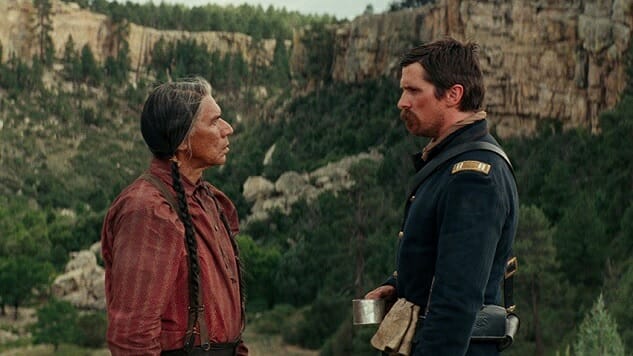Hostiles

A movie that tells you what you already know as if you didn’t already know it, Hostiles, the latest from writer-director Scott Cooper, is a Western film that stubbornly, studiously tries to elide its own genre. Hostiles very earnestly builds a case against the United States in the mistreatment of America’s indigenous people, apparently operating under the belief that most Americans in 2017 are somehow unaware of how we came to occupy and rule this country in the first place. Wouldn’t you know it: We murdered Native Americans in droves, snatched their ancestral lands from them and resolutely othered them.
Hostiles takes its message very seriously, as well it should, but to a point where the message first becomes comical, then insulting. What Cooper attempts here isn’t new—in fact, it’s quite old, a birthright of the Western genre. Since 1956, the movies have struggled to reckon with the genocide perpetrated by the United States upon the continent’s rightful inhabitants: See The Searchers, for a start, or hop forward eight years to Cheyenne Autumn. (Hell, just watch the best Western films to John Ford’s credit, and you’ll get the right idea.) With Hostiles, Cooper adds nothing to that reckoning other than loads of incoherent dialogue mumbled from behind beards and through grimaces. The film’s insistence on its own importance is embarrassing. It’s so busy trying to dignify one of America’s most revered genres that it forgets to be entertaining.
Cooper begins his story in 1892, as Mrs. Rosalie Quaid (Rosamund Pike) flees from a force of Comanche, who murder her husband and three children. Miraculously, she escapes. We then cut to Captain Joseph J. Blocker (Christian Bale), a grizzled and decorated military man ordered by his superiors to escort Yellow Hawk (Wes Studi), a dying Cheyenne war chief, to his home so that he may die with dignity in the place of his birth. Blocker, to the surprise of nobody, bristles at his assignment and even goes so far as to refuse it, but he’s such a devoted soldier that try as he might he cannot abandon his duty. So Yellow Hawk and Blocker set out on an uneasy road trip, accompanied by Blocker’s men (played by Rory Cochrane, Jesse Plemons, Jonathan Majors and Timothée Chalamet, 2017’s most ubiquitous breakout actor) as well as Yellow Hawk’s family (Adam Beach, Q’orianka Kilcher, Xavier Horsechief and Tanya Beatty).
Hostiles’ basic framework forces it into an episodic pace, where Blocker and his charges repeatedly run into obstacles and dangers, including the Comanche responsible for slaying Quaid’s family, and of course including Quaid herself, who joins their motley crew for lack of anything better to do with her time but sing lullabies to her kids’ corpses. Most expected of all, Blocker’s proximity to people he’s spent his life killing creates tension even at the most peaceful of times. Their company is a powder keg, though the fuse is one-sided. Blocker irrationally hates every Native American he lays eyes on. We get it: He’s been to war, he’s seen awful things and the sight of those awful things again gives him cause to profile.